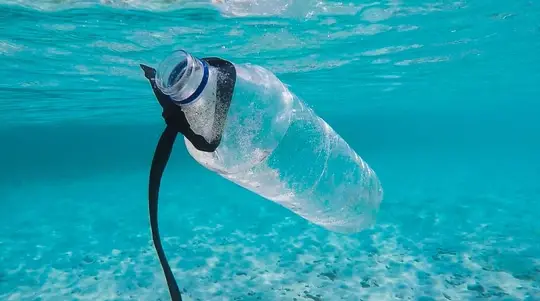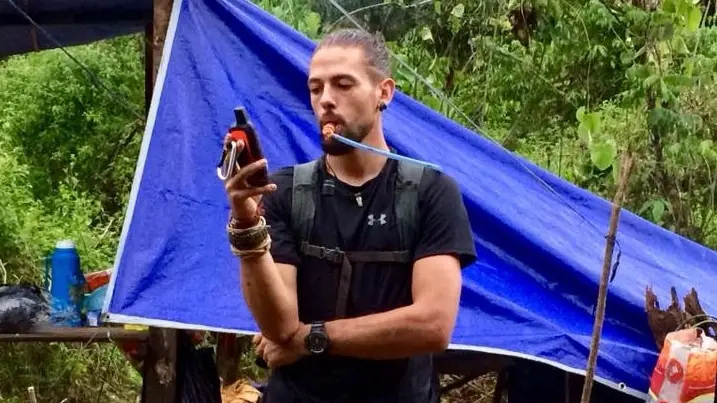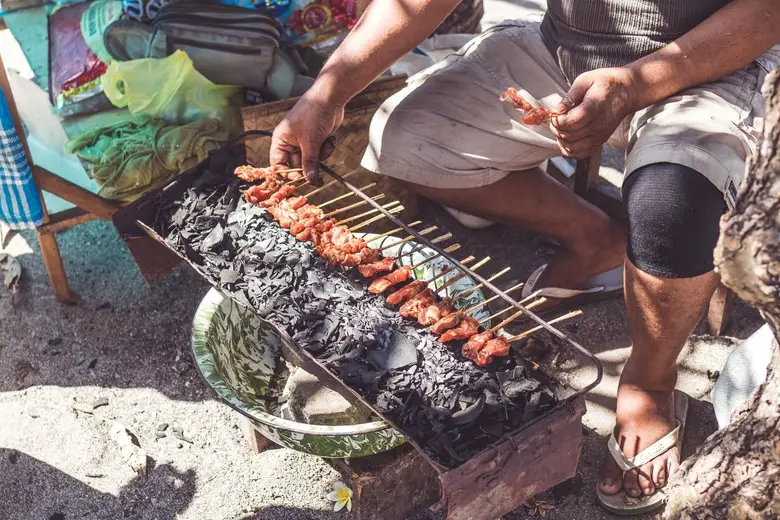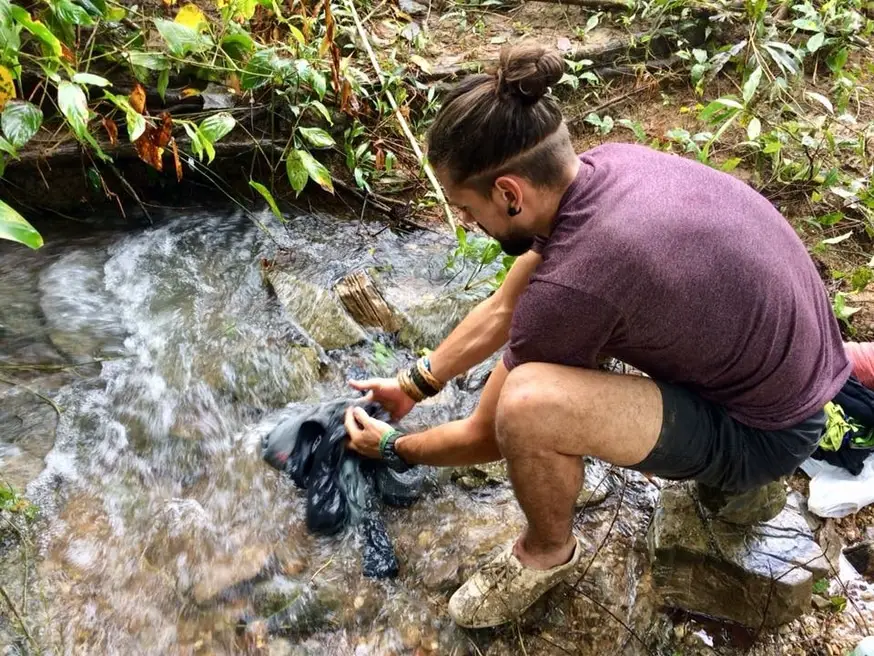Many tourists experience traveler’s diarrhea, or “Bali Belly” while in Indonesia because they drink or brush their teeth with the tap water. Additionally, any water that hasn’t been de-contaminated, such as river water, is not safe to drink and can lead to serious health problems if ingested. Unfortunately, a colleague of ours made the mistake of brushing his teeth with river water in Sulawesi and became so ill that he had to fly home. So, we often hear the question: Should I drink the tap water or untreated water while traveling in Indonesia? What about in high-volume tourist areas like Bali? Based on our experience and research:
No, you should not drink the tap water in Indonesia (including Bali). Your options for safe drinking water in Indonesia are bottled water, boiled tap water, canned drinks, or water that has been decontaminated via a combination of a water purifier filter and chlorine dioxide drops or iodine tablets.
How do you drink water safely in Indonesia (including Bali)?
Visitors to Indonesia should know that the tap water, even in high-volume tourist areas such as Bali, is not safe to drink unless you first treat it with methods described below. Knowing that Indonesia has a hot and tropical climate and that you’ll need to be drinking about 2 liters of water per day while you’re there—How do you drink water safely in Indonesia??
Is bottled water your only option?

No, bottled water isn’t the only option for staying safe while drinking water in Indonesia. Bottled water may not even be the safest choice—you still have to check the seals of the bottled water you drink to ensure it hasn’t been tampered with, and to only buy water made by reputable companies (Aqua is a popular one).
For those travelers looking for ways to avoid the unnecessary use of plastic bottles, as we face a major crisis in our oceans—if you’ve been to Southeast Asia, you’ve probably gotten a gut punch watching the great amount of plastic floating around as you swam or went diving. The bottled water industry is alive and well in Indonesia, but we do have other options as tourists to this beautiful country.
You can try to drink more canned drinks. Cans can be endlessly recycled, as opposed to a bottle which essentially has one life. Canned drinks are a good alternative for when you’re in the cities, but it’s hard to find canned water… And what about when you need to carry two liters of liquid or more? Cans aren’t ideal for hiking trips, spending hours out on a boat, or any of the many other activities you’ll want to do while in Indonesia.
Boiled tap water is also an option for travelers in Indonesia. This is the #1 way to purify water. When we were in remote parts of the jungle in Sulawesi, we only drank water that had been boiled. If you are boiling the water yourself, first make sure to filter it in order to remove any large particles that may contain harmful pathogens. Then, make sure to BOIL the water, not just heat it up, at 212 degrees Fahrenheit. In order for water to be safe enough to drink, to kill all bacteria and pathogens, the Environmental Protection Agency (EPA) recommends that water be boiled for at least one minute for altitudes up to 5,000 feet. If you’re at higher elevations, water needs to be boiled for three minutes.
Finally, if you can’t get a hold of bottled water, canned water, or boiled water—your next best option is to use a combination of a filtration system and a chemical disinfectant.
If you’ll be doing a lot of hiking and activities far from the big cities, and think that you won’t have access to the water sources previously discussed, then you can get yourself on Amazon: a water filtration system such as this one, chlorine dioxide treatment drops to disinfect the water after you filter it, and as a backup—iodine tablets.
Just filtering the water is probably not enough. If you plan on only buying a filter, read the small print very carefully on what exactly it eliminates in the water.
Before leaving for your trip, get a container, either a reusable water bottle or a platypus (2-liters) that you can refill and carry around with you using one of these methods.

Many hostels and hotels in Indonesia offer boiled tap water for free which you can use to refill your bottle or platypus.
Is tap water safe in Jakarta?
No. Even in the major cities in Indonesia, the tap water is not safe to drink. Most of the ground water in Jakarta and the area around it is contaminated.
Is it safe to drink boiled tap water in Indonesia (and Bali)?
Yes, as mentioned previously, you can drink boiled tap water in Indonesia (including Bali) as long as you boil it at 212 degrees Fahrenheit for at least 1 minute (3 minutes or more if you’re at an elevation above 5,000 feet). Also be sure to filter the water before you boil it to remove any larger particles that might have pathogens trapped inside.
How do I boil my own water while traveling?
Good question! If you don’t have a hostel or Airbnb kitchen to boil your water in, or if you’re traveling in more remote parts of Indonesia, you can choose to bring along a small water-boiling element to boil your own water. There are some of these available on Amazon.
You may also want to pack a sturdy titanium water bottle (check prices on Amazon here) with you on your travels, to store your clean boiled water, keep your tea and coffee hot on the go… save the planet by not buying plastic bottles, etc.!
Can I brush my teeth with tap water in Indonesia (and Bali)?
It’s better to be on the safe side and only use purified water to brush your teeth—so, no, don’t brush your teeth with the tap water in Indonesia (including Bali) unless you have boiled it or purified it first.
Is it safe to shower in Indonesia (and Bali)?
Yes, you can shower safely in the water in Indonesia (including Bali). Just don’t rinse your mouth with the tap water while you’re in the shower or taking a mandi.
Only use the tap water to wash and to flush the toilets in Indonesia. To brush your teeth, use bottled, boiled, or purified water only.
Is it safe to eat salad in Indonesia?
It’s always going to be a risk to eat raw fruits and vegetables that you haven’t handled and prepared yourself. Whether or not you get sick will depend on if the chefs washed their hands, if the veggies were properly washed beforehand, and if they were washed with clean water. A standard traveler rule of thumb is not to eat fruits and vegetables that have been peeled or cut.
However, in places like Bali, there are many restaurants selling raw food and salads with few problems. It’s ultimately up to you whether or not you want to take this risk during your trip.
Some travelers combat stomach issues before even arriving in Indonesia, taking a round of probiotics in advance of their trip. This can supposedly enhance your immune system, making your body more ready to face an unfamiliar bacterial landscape.
Is it safe to eat street food in Indonesia?

Street food gets a bad reputation and sometimes unfairly blamed for illnesses. But street food can be some of the most enjoyable food experiences you’ll have while traveling in Indonesia and Southeast Asia. You just have to choose your stall wisely.
Go to street food vendors that look busy—higher turnover means fresher, hotter food that hasn’t been sitting out with the chance of bacteria growing on it.
Check it out first! Does it look like it’s been sitting out in the sun forever or does it look fresh? Are there flies landing on the food? Does the oil look old and disgusting?! Sometimes your eyeballs and intuition will get you far. Trust your instincts.
Another tip another traveler once mentioned is to eat at street food vendors where you see lots of moms eating with their children. Moms want the best for their kids!
What else should I look out for in Indonesia in terms of water contamination?
It’s better to avoid ice in your drinks, as you can’t be should that the water used to make them has been purified.
It’s also a good idea to avoid home-brewed alcohol, as tempting as alcohol may be when you’re unsure of how clean your water is. There have been incidents in Indonesia of home-brewed alcohol causing blindness, brain damage, and death in Indonesians and tourists.
Carry hand sanitizer with you all the time and use it after going to the bathroom, handling cash, touching public door handles, shaking hands with people, etc.
Temple water in Indonesia
Do your research on water quality in certain temples with hot springs before you go. The popular Tirta Empul was said to be contaminated with E.coli a few years ago, and so definitely AVOID DRINKING the water in these places no matter how pure or clean they claim to be.
What illnesses can you get from drinking contaminated water?
Diarrhea is often the result of unclean drinking water, and actually kills millions of children every year. Diarrhea is the major risk to tourists who drink unsafe water while traveling in Indonesia, which rarely leads to death in these cases, but will significantly and negatively impact a person’s travels.
Other risks of unclean water include cholera, dysentery, salmonella, giardia, and typhoid fever. Viruses (such as hepatitis A, polio, and rotavirus) can also be water-borne. Not to mention chemical pollutants.
For all of these reasons, it’s very important to take precautions while eating and drinking in Indonesia.

Wash yourself in the water, wash your clothes in the water if you want, but don’t drink it!
How to Treat Traveler’s Diarrhea or “Bali Belly”
It’s horrible to get diarrhea during your travels. You’re far from the comfort of home. You have tons of fun plans that have to be put on hold. And you’ll most-likely be using an Indonesian-style bathroom which you may or may not be familiar/comfortable with!
Of course, prevention of traveler’s diarrhea is the best thing you can do to ensure a safe and fun trip for yourself in Indonesia. Follow the methods described above (drinking bottled or canned water, boiling your water, or purifying and decontaminating your water before drinking it) and you should be fine.
However, the CDC estimates that 30% to 70% of travelers experience diarrhea and travel in Asia is considered high risk. Some of the prevention methods that they recommend include:
- Taking a bismuth-containing antacid medicine (such as Pepto-Bismol). You can take the equivalent of two 262-mg tabs 4 times a day which can reduce your chances of getting diarrhea up to 50%.
- Keeping your hands clean.
- Eating and drinking safely by only eating food that is cooked and served hot; avoiding pre-peeled fruits and veggies and unpasteurized dairy products.
For treating mild or moderate diarrhea, the CDC recommends managing your symptoms by:
- Drinking fluids so you don’t get dehydrated.
- Taking medications such as Imodium which can decrease the number of times you have to go to the bathroom.
- Drinking water with rehydration salts.
For the treatment of severe diarrhea, you can use the treatments above, as well as taking antibiotics from a doctor if they’ve been prescribed. They recommend seeking healthcare if you develop signs of dehydration. This is especially important in the case of children.
Before leaving for Indonesia, pack some rehydration salts and over-the-counter diarrhea medication just in case. If you need medical assistance while visiting Bali, you can contact the Bali International Medical Centre (BIMC) which is open 24 hours and is accredited by the Australian Council on Healthcare Standard International – ACHSI. You can make an appointment by contacting:
☎️ +62 361 3000 911
🖥 nusadua@bimcbali.com
📳 +62 811-3896-113 (WhatsApp only)
